|
|
|
Sort Order |
|
|
|
Items / Page
|
|
|
|
|
|
|
| Srl | Item |
| 1 |
ID:
129898
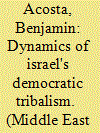

|
|
|
|
|
| Publication |
2014.
|
| Summary/Abstract |
This article evaluates Israeli national identity and its core founding tenets of Zionism, democracy, and Judaism. For decades, demographic changes and associated cultural and ideological fluctuations have gradually pushed Israel into a national identity conflict, as multiple ethnic and sectarian identity groups have come to promote competing interpretations of the state's purpose, political nature, and connection to territory. Continued demographic shifts, situated amid the sociopolitical dynamics of what this article will define as Israel's "democratic tribalism," will further test the compatibility of the constituent parts of Israeli national identity: the respective roles of Zionist ideology, democratic institutions, and the territory of the historic Jewish homeland.
|
|
|
|
|
|
|
|
|
|
|
|
|
|
|
|
| 2 |
ID:
131855
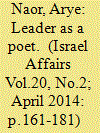

|
|
|
|
|
| Publication |
2014.
|
| Summary/Abstract |
This article analyses Ze'ev Jabotinsky's Zionist ideology as expressed in his political poetry. It includes inter alia lessons from the pogroms, the need for emergence of 'a new Jew' who would show by his conduct that he is 'a son of kings', who is ready to either die or capture the mountain, believing in the Jewish national right over the Land of Israel on both banks of the Jordan, as well as in the rights of its Arab and Christian inhabitants. These and other ideological principles appear in his poetry alongside a war of words with the Zionist left.
|
|
|
|
|
|
|
|
|
|
|
|
|
|
|
|
| 3 |
ID:
086176
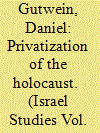

|
|
|
|
|
| Publication |
2009.
|
| Summary/Abstract |
Politically and culturally the collective memory of the Holocaust plays a key role in constructing Israeli identity. Three main periods can be discerned in Holocaust memory in Israel: divided memory, nationalized memory, and privatized memory. This article discusses the privatization of the Zionist-nationalized memory of the Holocaust in Israel during the 1980s and 1990s as an ideological product of the privatization revolution through which Israel has gone. The article focuses on the role played by Post-Zionism in privatizing Holocaust memory by depicting Zionist ideology and Israeli politics that portrayed the nationalized memory as oppressive. In privatizing Holocaust memory, Post-Zionism reaffirmed its nature as the meta-ideology of the Israeli privatization revolution and dismantling of the welfare state.
|
|
|
|
|
|
|
|
|
|
|
|
|
|
|
|
| 4 |
ID:
107592
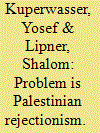

|
|
|
|
|
| Publication |
2011.
|
| Summary/Abstract |
Nearly two decades of peace negotiations between Israel and the Palestinians have failed miserably. The key reason for this failure is the Palestinians' refusal to recognize Israel as a Jewish state.
|
|
|
|
|
|
|
|
|
|
|
|
|
|
|
|
| 5 |
ID:
118536
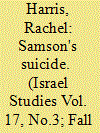

|
|
|
|
|
| Publication |
2012.
|
| Summary/Abstract |
Drawn from the biblical narrative, the image of Samson came to be used as a depiction of the self-sacrificing nationalistic ideal that dominated Zionist ideology. Though much has been said about the popular and widespread use of this image in Israeli society and culture, I contend that it was not solely his heroism, strength, and symbolic identity as the new Jew that marked this biblical figure for reuse in popular forums, but that his final suicide (martyred sacrifice) underpinned the drama of the Samson narrative. The symbolism of Samson soldiers willing to sacrifice themselves for the modern nation state altered as attitudes towards sacrifice for the collective changed. The heroism of the Samson myth collapsed, and subsequently was inverted, becoming a powerful tool for criticizing the Israeli military hegemony. This article traces a literary history of the changing narrative of the archetypal Samson.
|
|
|
|
|
|
|
|
|
|
|
|
|
|
|
|
| 6 |
ID:
114168
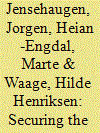

|
|
|
|
|
| Publication |
2012.
|
| Summary/Abstract |
Between early 1947 and May 1948, the Zionist movement went from being a non-state actor representing the minority population within the territory of the British Mandate of Palestine to establishing the State of Israel, which would be recognised almost instantaneously by the world's two Superpowers, the United States and the Soviet Union. Such a result, however, was never a given. What processes allowed a non-state actor, the Zionist movement, to secure international acceptance for the creation of a Jewish state in highly ambiguous circumstances? This analysis explores the dual-track adopted by the Zionist movement, whereby it worked to create facts on the ground within Palestine whilst securing support for its state-building project at the international level. By establishing state-like institutions in Palestine whilst building international support, the Jewish Agency was able to secure for itself a unique place from which to declare statehood.
|
|
|
|
|
|
|
|
|
|
|
|
|
|
|
|
|
|
|
|
|